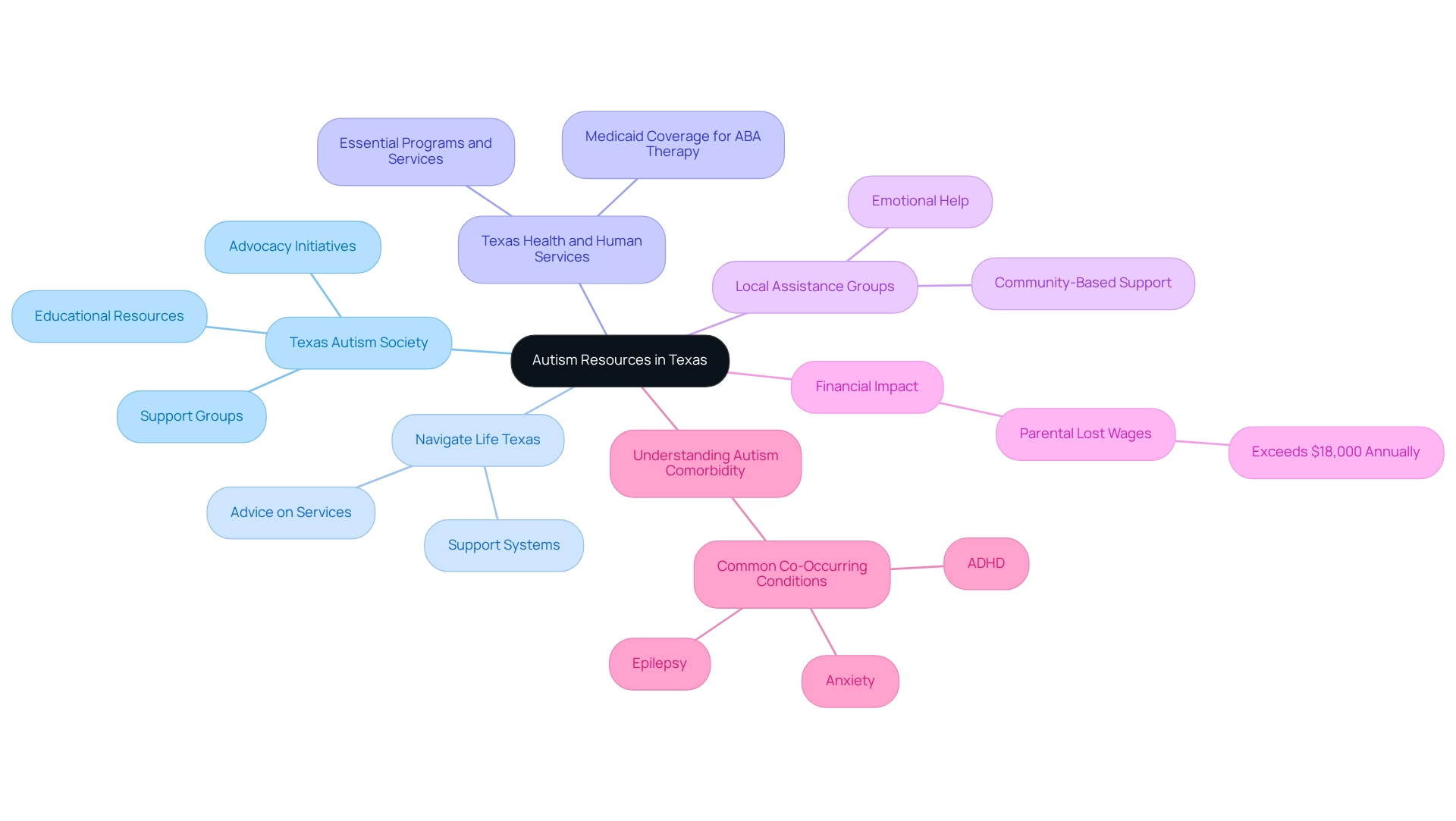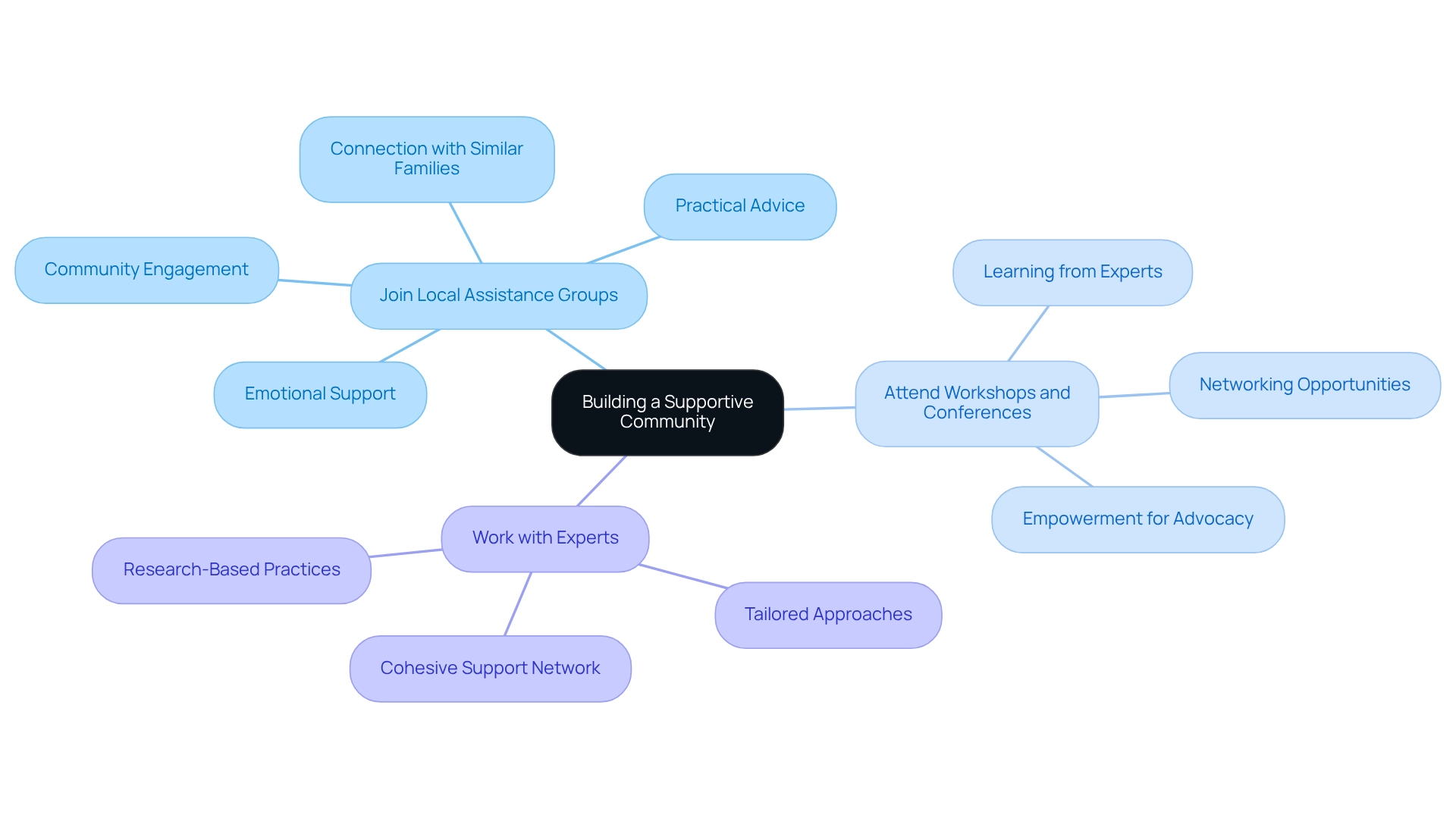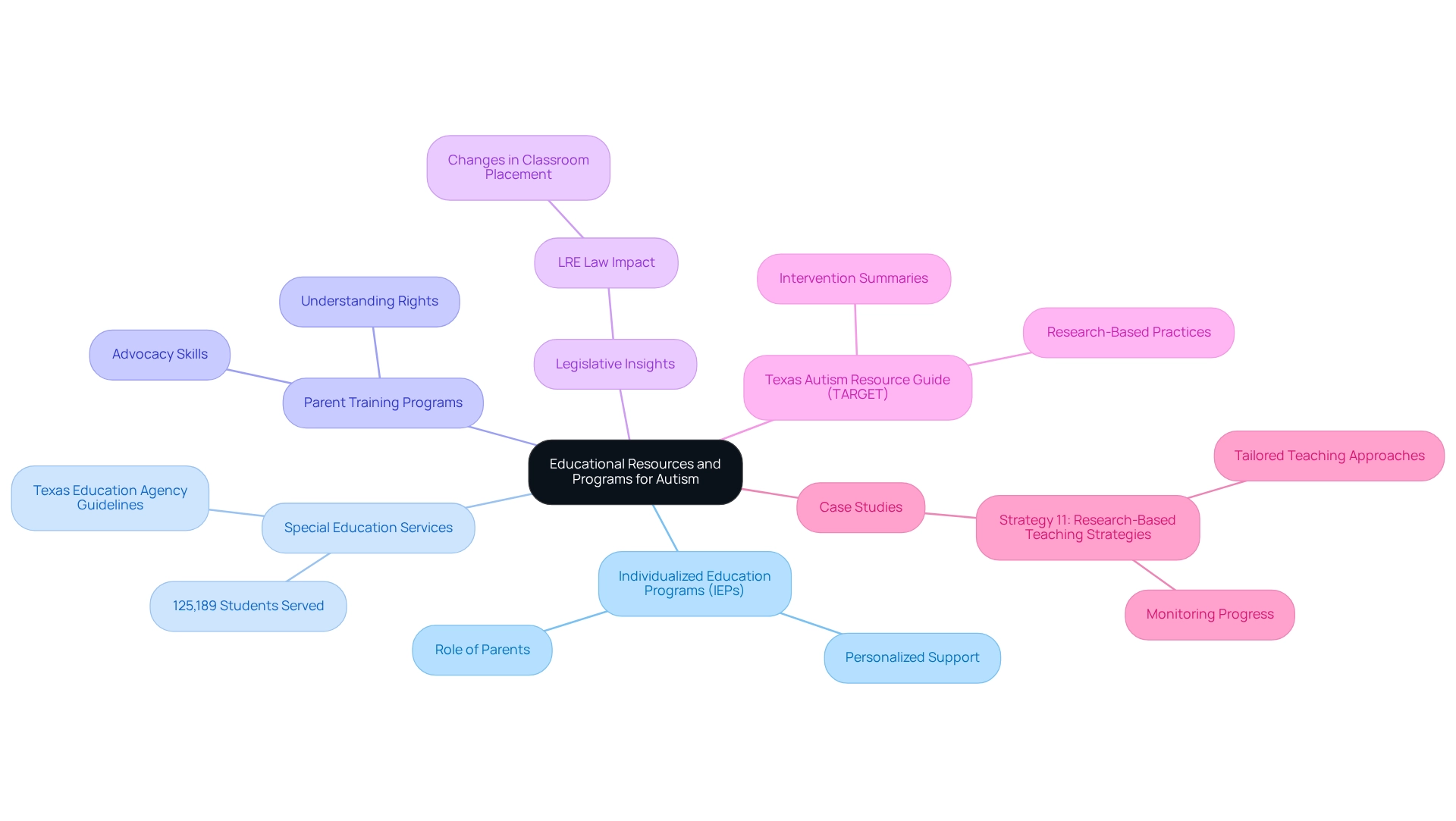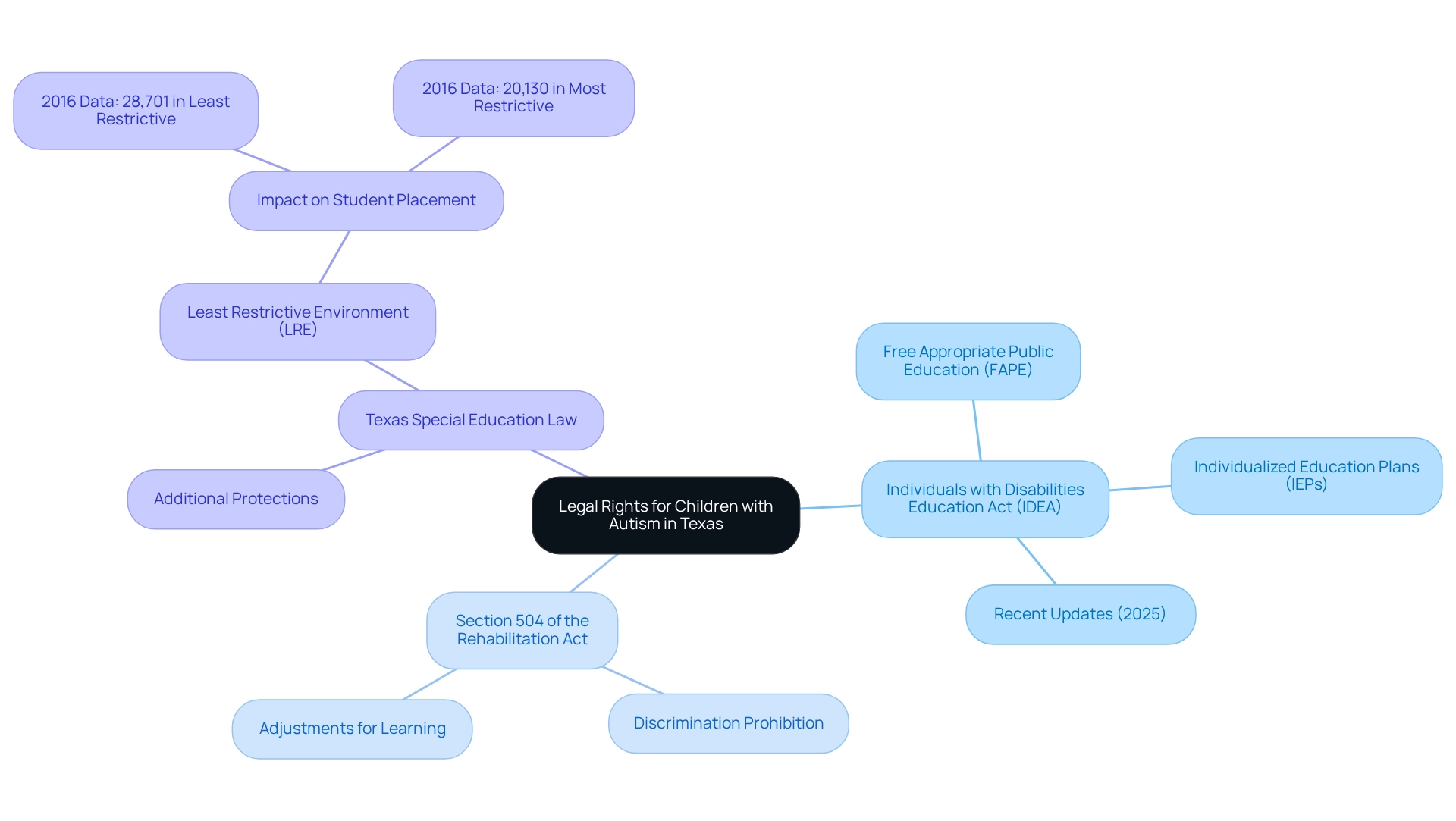Overview
Understanding autism in Texas is vital for parents and advocates. This journey encompasses key concepts such as the spectrum of symptoms, the significance of early diagnosis, and the wealth of resources available for support. Timely intervention and access to tailored therapies, like ABA, can significantly enhance outcomes for children with autism. This underscores the necessity for informed advocacy and community engagement.
As parents, navigating the complexities of autism can feel overwhelming. You may wonder about the best ways to support your child and what resources are available. It's important to know that you are not alone in this journey. Many families face similar challenges, and there are communities ready to offer support and understanding.
Engaging with local organizations and seeking out tailored therapies can make a profound difference. By advocating for your child and connecting with others, you can foster an environment of growth and learning. We encourage you to explore the resources available in your community, share your experiences, and connect with others who understand your journey. Together, we can create a supportive network that empowers families and advocates alike.
Introduction
In a world where autism is increasingly recognized, understanding the complexities of Autism Spectrum Disorder (ASD) has never been more crucial. This multifaceted neurodevelopmental condition presents unique challenges and strengths for individuals, making awareness and education vital for parents, advocates, and the community at large. The journey can feel overwhelming, especially when considering the significance of early diagnosis and tailored interventions. In Texas, a wealth of resources is available, yet navigating the autism landscape can be daunting.
This article delves into essential concepts surrounding autism, exploring effective therapies like Applied Behavior Analysis (ABA). It highlights the importance of community support and legal rights, equipping families with the knowledge they need to advocate effectively for their children. Together, we can foster a deeper understanding and create a supportive environment for those affected by ASD.
What is Autism? Key Concepts and Definitions
Autism, or Autism Spectrum Disorder (ASD), is a multifaceted neurodevelopmental condition that presents challenges in social communication, restricted interests, and repetitive behaviors. For parents and advocates, understanding the key concepts surrounding ASD is essential:
- Spectrum: The term 'spectrum' reflects the diverse range of symptoms and abilities associated with autism. Each person on the spectrum may display distinct challenges and strengths, necessitating personalized methods to assist.
- Diagnosis: While this condition is often identified in early childhood, signs can emerge as early as 18 months. Early diagnosis is critical, as it allows for timely interventions that can significantly improve outcomes. Recent statistics suggest that the average age of diagnosis has been a central focus of research, with efforts directed at lowering this age to ensure children receive the assistance they require as promptly as possible. In 2025, the average age of diagnosis is projected to be a key area of focus, highlighting the ongoing need for awareness and timely intervention.
- Common Signs: Identifying the signs of autism is essential for guardians. These may include difficulties with eye contact, challenges in interpreting social cues, and a strong preference for routines. By understanding these indicators, parents can better recognize when to seek professional assistance.
Current data from the CDC reveals that approximately 1 in 59 children is identified with ASD, underscoring the importance of awareness and early intervention. In Texas, recent statistics indicate an increasing occurrence of autism and other developmental disorders, emphasizing the necessity for accessible resources and support systems for families. Notably, 36.5% of caregivers for individuals with developmental disorders utilize ABA therapy, highlighting its significance in the context of support.
Real-world examples illustrate the impact of early diagnosis and intervention. For instance, case studies from organizations such as Prospera Healthcare demonstrate how customized therapy plans created by Board-Certified Behavior Analysts (BCBAs) can assist families in navigating treatment challenges, encouraging progress and development for their children. Fayge Orzel states, "We are committed to offering tailored ABA therapy solutions that promote growth," reinforcing the importance of personalized approaches in therapy.
Experts in the field stress the importance of early diagnosis, noting that timely intervention can lead to significant improvements in social skills and overall development. By equipping themselves with knowledge about the characteristics of spectrum disorders, parents can play a pivotal role in their child's journey toward success.
Navigating Autism Resources in Texas: A Comprehensive Guide
Texas is home to a diverse array of resources designed to support families impacted by autism. In 2025, these essential resources are more important than ever, providing hope and assistance to those in need.
The Texas Autism Society plays a pivotal role in connecting families with local support groups, advocacy initiatives, and educational resources. In 2025, the Texas Autism Society has assisted thousands of families, offering vital information and resources tailored to their unique needs. The financial strain on families is considerable, with parental lost wages from caring for a dependent with special needs surpassing $18,000 annually. This stark reality underscores the necessity of these resources.
Navigate Life Texas serves as an invaluable resource for families of children with disabilities, providing extensive advice on available services and support systems. This platform empowers families to navigate the complexities of developmental disorder care effectively, ensuring they feel supported and informed.
The Texas Health and Human Services agency offers essential programs and services for children with autism, including Medicaid coverage for ABA therapy. Their initiatives are crucial for ensuring that families have access to necessary treatments and assistance, alleviating some of the burdens they face.
Across Texas, local assistance groups provide community-based support where parents can connect, share experiences, and receive emotional help. These groups foster a sense of belonging and understanding among families facing similar challenges. Success stories from Texas Autism Society support groups highlight the transformative effect of community involvement, with families noting significant enhancements in their children’s social skills and overall well-being through participation in these groups.
Kyle Coddington, CEO of Prospera Healthcare, emphasizes the significance of these resources, stating, "Every day, ABA therapists at Prospera Healthcare unlock the potential in children with developmental challenges, turning small moments into life-changing breakthroughs."
Additionally, the case study titled "Understanding Autism Comorbidity: Common Co-Occurring Conditions" offers insights on managing co-occurring conditions such as ADHD, anxiety, and epilepsy, which are pertinent to the discourse on related resources. For those seeking a comprehensive list of resources, the Texas Autism Society website and the Navigate Life Texas portal serve as invaluable starting points. As the landscape of developmental support continues to evolve, staying informed about the latest updates and available services is essential for effective advocacy and assistance.

Understanding ABA Therapy: Techniques and Benefits for Children with Autism
Applied Behavior Analysis (ABA) is a compassionate therapeutic method grounded in behavioral science, designed to enhance social, communication, and learning abilities in individuals with autism in Texas. This approach incorporates several essential techniques:
- Discrete Trial Training (DTT): This structured method simplifies complex skills by breaking them down into smaller, manageable components, allowing for focused teaching and mastery. As noted by Peterson et al., DTT transforms complexity into clarity by teaching large tasks through straightforward and systematic methods.
- Natural Environment Training (NET): Skills are taught in real-world settings, which helps in generalizing learned behaviors to everyday situations—an aspect crucial for practical application.
- Positive Reinforcement: By rewarding desired behaviors, this technique enhances motivation and encourages learning, making it a fundamental aspect of ABA therapy.
The benefits of ABA therapy are profound. Research shows that early intervention can lead to significant improvements in communication skills, independence, and social interactions. For instance, a recent study revealed that among youngsters who concluded ABA therapy after 24 months, 21% did so because they had successfully achieved their treatment goals, underscoring the effectiveness of early and focused interventions.
Moreover, case studies highlight the transformative impact of ABA techniques. A notable case study, titled "Building Trust: The Key to Effective ABA Therapy for Autism," emphasizes the importance of establishing trust between therapists and their young clients. It illustrates that nurturing a trusting relationship enhances therapy effectiveness, leading to better engagement and improved outcomes for young individuals.
Current studies continue to explore the advantages of ABA therapy, particularly for high-functioning individuals with autism in Texas. As the field progresses, it is vital to address barriers to treatment access and develop an implementation framework that supports effective service delivery. Future research should also investigate reasons for service discontinuation and the effectiveness of ABA for high-functioning individuals with ASD.
By utilizing these insights and methods, parents and supporters can navigate the complexities of treatment for individuals on the spectrum more effectively, ultimately unlocking the potential of youth with developmental differences.
Challenges Faced by Parents and Advocates: Strategies for Support
Guardians of individuals with developmental disorders encounter a range of unique challenges that can significantly impact their emotional well-being and daily lives. These concerns are crucial to acknowledge:
- Emotional Stress: Raising a child with autism can take an emotional toll that is substantial. Research shows that caregivers frequently experience heightened stress levels, which can detrimentally affect their quality of life. The Pediatric Quality of Life (PedsQL) Inventory, consisting of 20 items, quantifies this emotional strain. To alleviate such stress, caregivers are encouraged to connect with local family groups and mental health professionals, fostering a supportive network of shared experiences. As Merve Yesilkaya from the University of Barcelona wisely notes, "Coping strategies are essential for parents to manage the emotional challenges they face."
- Navigating Services: The array of available services can feel overwhelming. Parents are encouraged to utilize resources like Navigate Life Texas, which provides comprehensive information on services tailored for individuals with autism. This platform simplifies the process of finding appropriate assistance, ensuring families can access the help they need without unnecessary confusion. The importance of focused intervention initiatives for caregivers of individuals with ASD cannot be overstated, as they deliver organized support that can significantly improve outcomes.
- Time Management: Balancing therapy sessions, school meetings, and family obligations can be daunting. Establishing a structured schedule is vital for effective time management. By prioritizing tasks and dedicating specific time slots for each responsibility, caregivers can create a more balanced routine that addresses their child's needs while also allowing for personal time.
Engaging with other guardians and professionals proves invaluable. Sharing experiences and effective strategies empowers families to navigate the complexities of support services with greater confidence. Numerous case studies, including those exploring geographical differences in parenting stress, highlight the importance of understanding the diverse challenges faced by caregivers in different regions. This comprehension can enhance assistance systems and interventions tailored to specific cultural contexts.
Building a Supportive Community: Collaborating with Other Parents and Professionals
Creating a nurturing community is essential for parents and advocates navigating the complexities of developmental disorders. To foster such a community, consider the following effective strategies:
-
Join Local Assistance Groups: Engaging with local autism assistance groups can provide invaluable emotional support and practical advice. These groups not only offer a safe space for sharing experiences but also help connect families facing similar challenges. In Texas, the increasing involvement in local assistance groups reflects a growing recognition of their benefits for those affected by autism. The CRDC survey, boasting an impressive 99.8% response rate, underscores the importance of community engagement in addressing the needs of families impacted by autism.
-
Attend Workshops and Conferences: Events like the Autism in Texas Conference serve as vital platforms for caregivers to learn from experts in the field. These gatherings enhance understanding of the condition while creating opportunities for networking with other families and professionals. The insights gained from workshops empower parents to advocate more effectively for their children. The Autism Society Board emphasizes that individuals with autism should lead dignified, productive lives through access to appropriate education and support.
-
Work with Experts: Building strong relationships with educators, therapists, and other professionals is crucial for enhancing the support your child receives. Collaborative efforts can lead to tailored approaches that meet individual needs, ensuring young individuals benefit from a cohesive support network. The Texas Autism Resource Guide for Effective Teaching (TARGET) illustrates how systematic evaluations of intervention practices can bolster community initiatives and improve educational strategies for individuals with autism in Texas.
By actively nurturing these connections, caregivers can create a robust network that not only contributes to their own well-being but also significantly benefits their children. Advocates highlight the importance of communal support, emphasizing that collaboration between guardians and experts is vital to unlocking the potential of individuals on the autism spectrum. Furthermore, addressing the need for policy reform and improved resource allocation is essential to overcome the disparities faced by families, reinforcing the idea that a collaborative strategy is crucial in advocacy efforts.

Educational Resources and Programs: Advocating for Your Child's Needs
In Texas, a wealth of educational resources and programs exists to support children with autism, empowering parents to advocate effectively for their children's needs.
Individualized Education Programs (IEPs) are crucial for ensuring that children receive personalized educational support tailored to their unique challenges. Parents play an essential role in supporting these programs, which are designed to address the specific requirements of every young person.
Special Education Services: The Texas Education Agency outlines comprehensive guidelines for accessing special education services. During the 2023-2024 academic year, approximately 125,189 students in Texas received special education services due to autism, highlighting the significant need for tailored educational support.
Parent Training Programs: Numerous organizations provide training initiatives designed to equip parents with the knowledge and skills needed to understand their rights and advocate effectively for their children. These programs are vital for navigating the complexities of the educational system and ensuring that young learners receive the support they require.
Legislative Insights: According to Hannah Cooley, a research student, "The LRE law has changed the way Texas places students in certain classrooms," indicating the evolving landscape of educational placements and the importance of advocacy in this context.
Texas Autism Resource Guide for Effective Teaching (TARGET): This guide summarizes systematic reviews of intervention practices for young individuals with developmental disorders, assisting schools in developing research-based practices from referral to program implementation.
Real-world examples illustrate the impact of effective advocacy for IEPs. A case study on research-driven teaching techniques highlights the significance of personalized approaches, urging parents to track their children's progress and question standard methods that may not meet particular needs. The case study titled 'Strategy 11: Research-Based Teaching Strategies' emphasizes that teaching strategies should be grounded in peer-reviewed, research-informed practices customized to the individual requirements of each student with special needs.
Educators also acknowledge the importance of IEPs, indicating that they can significantly enhance educational outcomes for individuals with autism in Texas.
By utilizing these resources, parents can confidently navigate the educational environment, ensuring their children receive the necessary support to thrive.

Understanding Legal Rights: Protections for Children with Autism in Texas
In Texas, youth with developmental differences, including those with autism, benefit from a robust system of legal safeguards designed to secure their educational rights and promote inclusivity. Understanding these laws is crucial for parents and guardians, as they navigate the educational landscape to advocate for their children.
Key laws include:
- Individuals with Disabilities Education Act (IDEA): This federal law ensures that children with disabilities, including autism, receive a Free Appropriate Public Education (FAPE). The recent updates to IDEA in 2025 highlight the necessity of individualized education plans (IEPs) tailored to meet each child's unique needs, ensuring access to vital resources for academic success.
- Section 504 of the Rehabilitation Act: This law prohibits discrimination against individuals with disabilities in programs and activities receiving federal funding. It guarantees that students with developmental differences receive essential adjustments to support their learning and participation in school activities.
- Texas Special Education Law: This state-specific legislation complements federal laws by providing additional protections and guidelines for students with disabilities, including those with autism. It aims to foster a more inclusive educational environment, aligning with the Least Restrictive Environment (LRE) principle. Notably, a study on the LRE law in Texas revealed a significant increase in the number of students with developmental disorders placed in less restrictive settings, rising from 28,701 in 2016 to 20,130 in more restrictive environments.
Disability rights advocates emphasize that students with developmental differences should not be confined to limiting environments unless absolutely necessary. They possess immense potential and deserve learning opportunities in settings that nurture their personal and academic growth. As Hannah Cooley, a dedicated research student, poignantly stated, "Students with autism should not be isolated in Quest rooms unless absolutely necessary because they have big potential and deserve to learn in the least restrictive environment where they can succeed personally and academically."
For guardians and supporters, grasping these legal frameworks is essential. It empowers them to navigate the educational system effectively and advocate for their children's rights. Familiarity with IDEA and Section 504 is particularly vital; statistics indicate that many guardians remain unaware of these protections, which can hinder their ability to secure appropriate educational services. By becoming informed about these laws, parents can ensure compliance with legal requirements and advocate effectively for their children's educational needs, ultimately enhancing their overall educational experience.

Effective Communication Strategies: Advocating for Your Child's Needs
Effective communication is vital for advocating for your child's needs in the realm of developmental disorders. Consider these strategies that can significantly enhance your advocacy efforts:
- Be Clear and Concise: When expressing your needs, use specific and straightforward language. This clarity helps prevent misunderstandings and ensures your message is effectively conveyed to educators and professionals. Research indicates that effective communication strategies can yield a 1.15 effect size in improving non-imitative spoken communication acts among youth with autism, underscoring the importance of clear dialogue in advocacy.
- Document Everything: Keeping detailed records of meetings, communications, and your child's progress is crucial. Documentation not only supports your advocacy efforts but also provides a solid foundation for any necessary follow-up actions. As highlighted in the Siller 2013 study, comprehensive documentation can greatly influence navigating assistance services, ensuring that your child's needs are prioritized. Parents who document their interactions and observations often achieve more favorable outcomes in their advocacy efforts.
- Practice Active Listening: Engaging with educators and professionals through active listening fosters a collaborative environment. By acknowledging their perspectives and concerns, you can build stronger partnerships that enhance your child's development.
Practical examples illustrate the effectiveness of these approaches. For instance, parents who regularly recorded their child's progress and communicated effectively with school personnel reported significant improvements in their educational support. However, it's important to acknowledge that mixed results were found in RCTs examining efficacy in high-risk youth, suggesting that while some strategies may be effective, outcomes can vary.
Expert advice emphasizes the importance of documentation in advocacy. As professionals in the field point out, detailed records can significantly impact the navigation of support services, ensuring that your child's needs are prioritized. Moreover, ongoing research in this area indicates that the landscape of advocacy is evolving, potentially influencing future strategies.
By implementing these effective communication strategies, you can greatly enhance your advocacy efforts and ensure that your child's needs are met. Remember, you are not alone in this journey—your voice matters, and your advocacy can make a difference.
Conclusion
Understanding Autism Spectrum Disorder (ASD) is essential for fostering an informed and supportive environment for individuals affected by this multifaceted condition. The journey begins with recognizing the spectrum of autism, the importance of early diagnosis, and the critical role of tailored interventions like Applied Behavior Analysis (ABA). With approximately 1 in 59 children diagnosed with ASD, awareness and education are paramount for parents and advocates alike.
In Texas, a wealth of resources is available to assist families in navigating the complexities of autism care. Organizations such as:
- Texas Autism Society
- Navigate Life Texas
offer invaluable support, while local support groups foster community connections that alleviate emotional stress. Furthermore, the legal protections in place, including the Individuals with Disabilities Education Act (IDEA), empower families to advocate effectively for their children's educational rights.
By employing effective communication strategies and actively engaging with professionals and educators, parents can ensure their child's needs are prioritized. The integration of community support, educational resources, and legal protections creates a comprehensive framework that enhances the quality of life for individuals with autism.
Ultimately, by cultivating awareness, leveraging available resources, and advocating for inclusive practices, society can work together to unlock the potential of individuals with autism, fostering an environment where they can thrive and contribute meaningfully. The collective effort of families, advocates, and communities is vital to creating a brighter future for those on the autism spectrum.
Frequently Asked Questions
What is Autism Spectrum Disorder (ASD)?
Autism Spectrum Disorder (ASD) is a multifaceted neurodevelopmental condition characterized by challenges in social communication, restricted interests, and repetitive behaviors.
What does the term 'spectrum' refer to in the context of autism?
The term 'spectrum' reflects the diverse range of symptoms and abilities associated with autism, indicating that each person on the spectrum may exhibit distinct challenges and strengths, requiring personalized support methods.
When is autism typically diagnosed, and why is early diagnosis important?
Autism is often identified in early childhood, with signs potentially emerging as early as 18 months. Early diagnosis is critical as it allows for timely interventions that can significantly improve outcomes for individuals with autism.
What are some common signs of autism that parents should look for?
Common signs of autism include difficulties with eye contact, challenges in interpreting social cues, and a strong preference for routines. Recognizing these indicators can help parents determine when to seek professional assistance.
What are the current statistics regarding autism diagnosis?
According to the CDC, approximately 1 in 59 children is identified with ASD. In Texas, there has been an increasing occurrence of autism and other developmental disorders, highlighting the need for accessible resources and support systems.
What role does ABA therapy play in supporting individuals with autism?
ABA (Applied Behavior Analysis) therapy is significant for individuals with developmental disorders, with 36.5% of caregivers utilizing this therapy to support their children. Customized therapy plans created by Board-Certified Behavior Analysts (BCBAs) can help families navigate treatment challenges.
What resources are available for families impacted by autism in Texas?
In Texas, resources include the Texas Autism Society, which connects families with local support groups and advocacy initiatives, and Navigate Life Texas, which provides advice on available services. The Texas Health and Human Services agency offers essential programs, including Medicaid coverage for ABA therapy.
How can local assistance groups benefit families of children with autism?
Local assistance groups provide community-based support, allowing parents to connect, share experiences, and receive emotional help. Participation in these groups can lead to significant enhancements in children's social skills and overall well-being.
What is the financial impact on families caring for children with autism?
Families caring for a dependent with special needs can face considerable financial strain, with parental lost wages exceeding $18,000 annually, underscoring the necessity for support resources.
How can families stay informed about resources and support for autism?
Families can stay informed by visiting the Texas Autism Society website and the Navigate Life Texas portal, which provide comprehensive lists of resources and updates on available services for effective advocacy and assistance.




